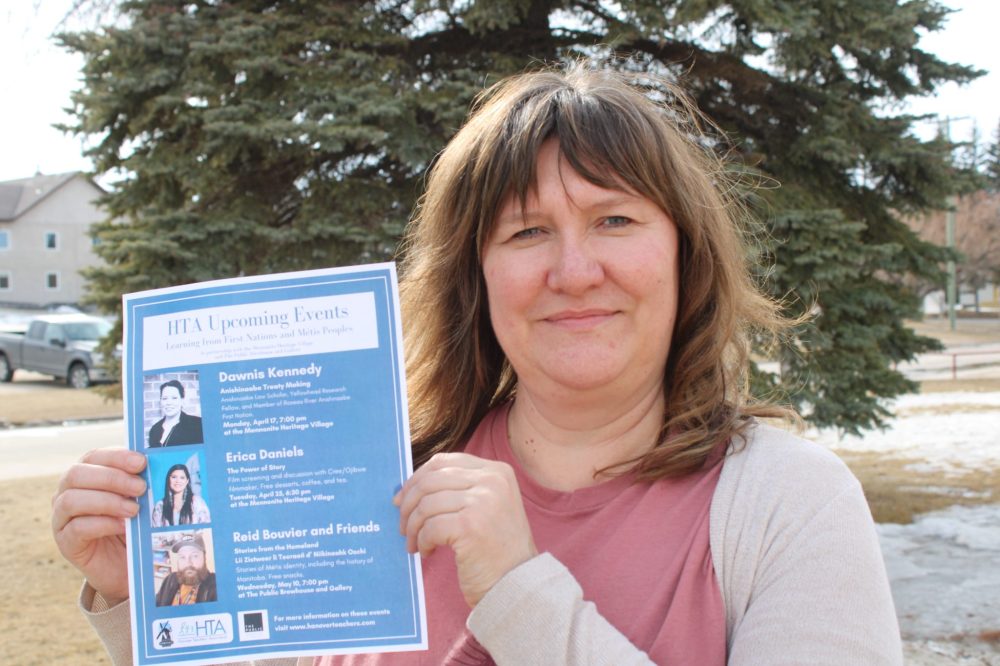Series to take on Indigenous issues
Advertisement
Hey there, time traveller!
This article was published 17/04/2023 (799 days ago), so information in it may no longer be current.
A trio of events will serve to educate the public on treaties and relationships between settlers and Indigenous peoples.
Hosted by the Hanover Teachers’ Association (HTA), the events will include two at the Mennonite Heritage Village, billed as part of their “All My Relations” series and one at The Public Brewhouse and Gallery in Steinbach.
HTA Indigenous Advocacy Chair Monica Martens said this series was the natural next step following a panel discussion hosted last year.

“There were many requests after that event for a few of those guests to be invited back,” she said.
Dawnis Kennedy is one of those to make a reappearance.
This time the Anishinaabe law scholar, Yellowhead Research Fellow and Roseau River Anishinaabe First Nation member will speak about treaty making.
“She’s a gifted and engaging scholar,” Martens said. “She talks about treaties from her Anishinaabe ancestry and her settler Canadian ancestry. She’s invited those who attend to bring their questions about connections between Anishinaabe and settler Canadians, and the role that treaties can play in growing a good relationship between those two groups.
That event takes place at 7 p.m. on April 17 at MHV.
On April 25, Cree and Ojibwe filmmaker Erica Daniels will present “The Power of Story”. The audience will have the opportunity to screen several of her films including “Run as One: The journey of the frontrunners”.
In that film the Peguis First Nation filmmaker explores the story of 10 Indigenous athletes who were torchbearers at the 1967 Pan Am Games in Winnipeg. They ran the torch from Minnesota to Winnipeg, but just outside the stadium the torch was handed to a non-indigenous athlete who took it in to the opening ceremonies. The torchbearers were not even invited inside and were instead sent to have lunch at a nearby restaurant.
That event begins at 6:30 p.m. on April 25 at MHV and includes free desserts, coffee and tea.
The third event features Steinbach Regional Secondary School teacher Reid Bouvier who will share the Metis perspective on May 10. He’ll talk about how the loss of the buffalo and the arrival of settlers changed their way of life.
That event will also include fiddle players.
“Stories from the Homeland” takes place at 7 p.m. on May 10 at The Public Brewhouse and Gallery.
Martens said it’s important for the HTA to offer events like this.
“We see that as the community learns more, it serves our students, because as parents learn they want our students to learn,” she said. “I think one of the designs of the reserve system that was instituted through the Indian Act was to separate Indigenous peoples and settlers to Canada.”
“Providing these opportunities is a gesture toward reconciliation and relationship building,” she added.
Treaty making
Dawnis Kennedy is also excited to be presenting to kick off the series.
“For me growing up in public school education, I got a really negative view of treaties,” she said. “It took me many layers of education to really appreciate how deep the misinformation I was getting from western education was, and how devalued the education I received from my family and the community was.”
Kennedy has many years of experience speaking about Indigenous issues.
Even as a teenager she was invited to speak at the Royal Commission on Aboriginal Peoples.
In recent years she’s worked for the Manitoba Indigenous Cultural Education Centre and is a repeat visitor to the Ginew School Gathering of Friends held on Roseau River Anishinaabe First Nation.
She said treaties were around long before the numbered settler treaties that most are familiar with.
“I can look at the elements of treaty making that we participated in prior to settler treaties to be able to understand the way my ancestors approached these treaties as part of a larger history,” she said.
Kennedy said she’s noticed a greater interest in Indigenous issues from the general population and credits that to the Truth and Reconciliation Commission, the Missing and Murdered Indigenous Women and Girls inquiry, and the Royal Commission on Aboriginal People.
“I think there’s a real drive for people to want to understand their relationship to these lands that isn’t reduced to colonization,” she said.
She’s happy to be part of making people more aware.
“I see it as a responsibility not to leave the following generations as impoverished as I was through education,” she said.
More information on these events can be found at www.hanoverteachers.com.
